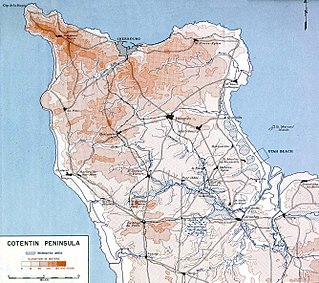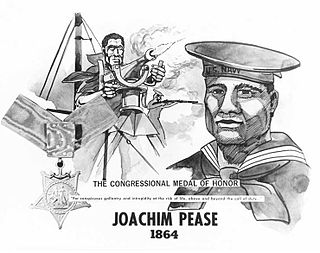
USS Kearsarge, a Mohican-class sloop-of-war, is best known for her defeat of the Confederate commerce raider CSS Alabama off Cherbourg, France during the American Civil War.

The Cotentin Peninsula, also known as the Cherbourg Peninsula, is a peninsula in Normandy that forms part of the northwest coast of France. It extends north-westward into the English Channel, towards Great Britain. To its west lie the Gulf of Saint-Malo and the Channel Islands, and to the southwest lies the peninsula of Brittany.

The French Navy, informally La Royale, is the maritime arm of the French Armed Forces and one of the four military service branches of France. It is among the largest and most powerful naval forces in the world recognised as being a blue-water navy. The French Navy is capable of operating globally and conducting expeditionary missions, maintaining a significant overseas presence. The French Navy is one of eight naval forces currently operating fixed-wing aircraft carriers, with its flagship Charles de Gaulle being the only nuclear-powered aircraft carrier outside the United States Navy, and one of two non-American vessels to use catapults to launch aircraft.

The Battles of Barfleur and La Hougue took place during the Nine Years' War, between 19 May O.S. and 4 June O.S. 1692. The first was fought near Barfleur on 19 May O.S., with later actions occurring between 20 May O.S. and 4 June O.S. at Cherbourg and Saint-Vaast-la-Hougue in Normandy, France.

Anne-Hilarion de Costentin, Comte de Tourville was a French Navy officer and nobleman who served under King Louis XIV. Born in Paris, he was made a Marshal of France in 1693. Tourville is considered by some as one of the most talented naval officers in French military history.

The Battle of Cherbourg, or sometimes the Battle off Cherbourg or the Sinking of CSS Alabama, was a single-ship action fought during the American Civil War between the United States Navy warship, USS Kearsarge, and the Confederate States Navy warship, CSS Alabama, on June 19, 1864, off Cherbourg, France.

The Battle of Cherbourg was part of the Battle of Normandy during World War II. It was fought immediately after the successful Allied landings on 6 June 1944. Allied troops, mainly American, isolated and captured the fortified port, which was considered vital to the campaign in Western Europe, in a hard-fought, month-long campaign.
Cherbourg is an ancient town in France. Cherbourg may also refer to:

The Sa'ar 3 class ("Cherbourg") is a series of missile boats built in Cherbourg, France at the Amiot Shipyard based on an Israeli Navy modification of the German Navy's Jaguar-class fast attack craft. They are also known as the stars of Cherbourg.

Joachim Pease was a United States Navy sailor and a recipient of America's highest military decoration—the Medal of Honor—for his actions in the American Civil War.
Events from the year 1864 in France.

The Raid on Cherbourg took place in August 1758 during the Seven Years' War when a British force was landed on the coast of France by the Royal Navy with the intention of attacking the town of Cherbourg as part of the British government's policy of "descents" on the French coasts.

The action of 20 October 1793 was a minor naval engagement of the French Revolutionary Wars fought off Cape Barfleur on the French coast of the English Channel. The early months of the war, which had begun in February, had seen a number of French frigates raiding British merchant shipping in the Channel, and HMS Crescent under Captain James Saumarez was deployed to watch the port of Cherbourg-en-Cotentin with the aim of disrupting the operations of the French frigates Réunion and Sémillante that were based in the harbour. On 20 October, Saumarez was waiting off Cape Barfleur for French movement when his lookout sighted Réunion and the cutter Espérance approaching from open water.

The bombardment of Cherbourg took place on June 25, 1944, during World War II, when ships from the United States Navy and the British Royal Navy attacked German fortifications in and near the city, firing in support of U.S. Army units that were engaged in the Battle of Cherbourg. In doing so, the Allied naval forces engaged in a series of duels with coastal batteries and provided close support to infantry as they fought to gain control of the city. The bombardment was initially scheduled to last just two hours but it was later extended by an hour to support army units attempting to break into Cherbourg's city streets. After the bombardment, German resistance lasted until June 29, when the port was captured by the Allies. Afterwards, the task of clearing the port for use lasted several weeks.

The Kearsarge at Boulogne is an oil-on-canvas painting by Édouard Manet completed in 1864. It depicts the Union sloop-of-war USS Kearsarge anchored at the French resort of Boulogne-sur-Mer.

John Hayes was a veteran of the American Civil War and a recipient of the Medal of Honor.

Ariane (Q122) was a French Navy Ariane-class submarine commissioned in 1929. During World War II, she operated on the Allied side until 1940, when she became part of the naval forces of Vichy France. She was scuttled in November 1942.

Eurydice (Q130) was a French Navy Ariane-class submarine commissioned in 1929. During World War II, she operated on the Allied side until 1940, when she became part of the naval forces of Vichy France. She was scuttled in November 1942.

Orphée (Q163) was a French Navy Diane-class submarine commissioned in 1933. During World War II, she operated on the Allied side until 1940, when she became part of the naval forces of Vichy France. In 1942 she joined the Free French Naval Forces. She was condemned in 1946.















